The Losing Battle to Beat Antisemitism in the Age of Misinformation
Politico (archive.ph)
By Bryan Bender
2024-04-27 11:00:00GMT
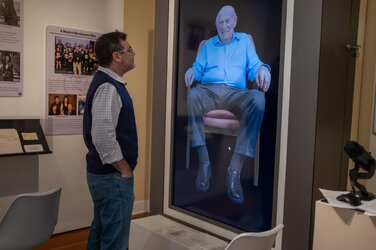
Author Bryan Bender interviews the "interactive biography" of Holocaust survivor Oskar Knoblauch. | Sarah Adler for POLITICO
PHOENIX — On a recent afternoon in the state’s oldest synagogue, a college sophomore sat in front of a large video screen and posed an age-old question to the recorded image of a balding man in a blue dress shirt, fidgeting in an armchair.
“What is antisemitism?” the young woman inquired. After a few seconds — the time it took for a natural language processing program to engage — the man on the screen began to speak. His voice was gravelly but clear and still retained a hint of his childhood in Leipzig, Germany, during World War II.
“Antisemitism is like crabgrass,” Oskar Knoblauch, a 98-year-old Holocaust survivor, responded. “It always appears after a rainy season. When it’s dry, you don’t see them. They reappear again. Sometimes, maybe in a small way, sometimes worse. We have to control it.”
The real Knoblauch, a lifelong activist who has visited dozens of Arizona schools and community centers to share his life story, is among a quickly dwindling group who can still bear witness to the extermination of 6 million Jews and millions of others by Nazi Germany eight decades ago. Even the youngest survivors are reaching the end of their natural lives; it is estimated that by 2030 only 100,000 Holocaust survivors worldwide will remain.
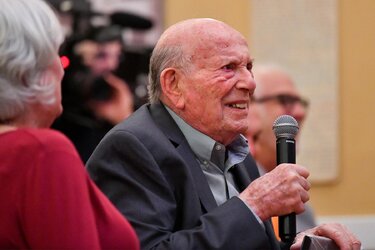
Holocaust survivor Oskar Knoblauch talks to students from Ingleside Middle School at a performance of "Music and the Holocaust." | Courtesy of Arizona Jewish Historical Society
Knoblauch’s “interactive biography” — some 2,000 of his responses have been recorded, allowing people like the college sophomore to have extended “conversations” with him and other survivors — will be a featured exhibit in what organizers at the Arizona Jewish Historical Society envision as a state-of-the-art Holocaust and genocide education facility. There are scores of Holocaust museums in the United States, with at least a half-dozen now being constructed or revamped, but Phoenix stands out as the largest American city without one. The timing of the new project, called the Hilton Family Holocaust Education Center for the primary funders, has coincided auspiciously with the effort by Arizona lawmakers on both sides of the aisle to enhance Holocaust education in the state’s public schools. This combination of private initiative and legislative mandate has made Arizona something of a laboratory for how to devise innovative teaching methods. The growing consensus is that to overcome the dehumanizing partisanship of social media young people need to be trained to empathize with victims of oppression, not just presented with dry textbook facts.
In 2021, the state Legislature passed a law that required students be introduced to the Holocaust at least twice between grades 7 and 12, joining more than two dozen other states that have enacted similar mandates over the decades, producing what most advocates agree have been mixed results. Arizona still has no official curriculum, or dedicated funding to support related programs and teacher training, and no formal mechanism to ensure school districts are following the law.
“What we are doing isn’t working in its own right,” Volker Benkert, a professor of German and European history at Arizona State University who studies the roots of genocide and is advising the education center organizers, told me. “I’m worried that we are building a Holocaust museum with narratives of the past.”
A recent poll by YouGov and The Economist found that one in five young Americans believe the Holocaust is a myth. A United Nations review in 2021 of thousands of posts on social media sites such as Facebook, X (formerly Twitter), TikTok, Instagram and Telegram also found that significant percentages of Holocaust-related content either “denied or distorted” the historical facts. On Telegram, it was fully half of all the posts reviewed.
This denial parallels a steep rise in antisemitic rhetoric and violence nationwide that has been supercharged by Israel’s military counteroffensive in Gaza following the Oct. 7 massacre of 1,200 Jews by the terrorist group Hamas. “For a group that represents only about 2.4 percent of the American public, they account for something like 60 percent of all religious-based hate crimes,” FBI Director Christopher Wray testified in October to the Senate Homeland Security and Government Affairs Committee, referring to the population of an estimated 7 million American Jews. Just ahead of the Passover holiday, Wray told Congress last week that between Oct. 7 and Jan. 30, “we opened over three times more anti-Jewish hate crime investigations than in the four months before Oct. 7.”
The effort to reclaim the upper hand in the information war was on display at a community performance not long ago at the Arizona Jewish Historical Society, which operates out of the restored Spanish-style synagogue built in 1921 that will serve as the nucleus of the $30-million education center.
“You are the last generation of students that are going to get to meet and interact and talk to Holocaust survivors,” Lawrence Bell, executive director of historical society, told youngsters from Ingleside Middle School. “Right now, we are in a wave of antisemitism. They are going to say the Jewish people just invented the Holocaust because they want sympathy for all the bad things they do. And you’re going to say ‘No, that’s not true, that’s false. I met a person that was in the Holocaust, that survived it.”
“You are the last generation,” he added, “that is going to be able to say that.”
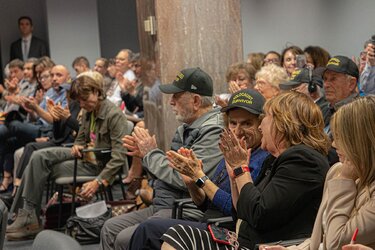
Holocaust survivors and supporters asked state lawmakers to require the Holocaust and other genocides to be taught in Arizona schools. | Annabella Piunti/Cronkite New
‘You can’t bury it’
Some of Ben Toma’s earliest memories growing up in Romania were of family road trips to visit his grandparents. Along the route, he was perplexed by a hillside cemetery, walled off, the grave markers painted white.
“I had seen cemeteries, but they are usually around a church,” he recounted to me. “I asked my mom, ‘What is that?’ She finally told me, ‘That’s where the Nazis rounded up a number of Jews and murdered them.’”
The 44-year-old father of five is now the Republican speaker of Arizona’s House of Representatives and a leading supporter of building the new education center, including backing legislation to allocate state funds. “If you don’t educate kids on what happened, you’re more likely to repeat it,” said Toma, who fled the communist regime in Romania with his family in 1986.
He sees the rise of antisemitism, particularly on college campuses, as mostly a well-meaning desire to right wrongs, in many instances overcorrecting for the long and tragic history of the Palestinian people by arguing against Israel’s right to exist. “Some of them are marching for the wrong reasons, out of confusion,” he told me. “Some of them don’t understand what’s actually happening in Israel. But I think there are among them those [who] fundamentally do hate still. At the end of the day, I think that’s evil.”
“There is a long history to [antisemitism] and you can’t bury it,” he added. “If you bury it, these young, idealistic kids will have no idea of what actually happened and what led to the current state of affairs.”
Toma, who invited Holocaust survivors to attend the opening of the legislative session in January, has joined with 30-year-old Democratic state Rep. Alma Hernandez, the first Mexican American Jewish woman to hold elected office in the United States, to ensure the Arizona Holocaust education mandate is met.
Hernandez, the lead sponsor of the original Holocaust legislation in 2021, more recently steered a funding bill through the state Legislature seeking up to $10 million to support the new education center. The final amount is still to be negotiated by House and Senate leaders, including Toma. That’s on top of a $2 million commitment last fall from the city of Phoenix.
There’s a gap, however, between the Legislature’s will and what happens in the classroom.
The superintendent of Arizona public schools, Tom Horne, recently reported that a survey of the state’s 750 districts raises serious questions about whether the mandate is being followed. “That’s why we need a bill giving it some substance, and this survey that we did from superintendents confirms that need because if over half didn’t respond it makes you think, ‘Well, maybe they weren’t doing it or doing it in a very minimal way,’” Horne said.
To remedy that, Hernandez sponsored separate legislation this session to establish a commission to determine how best to ensure the education mandate is carried out, including by assessing the approaches of other states. The bill was signed by Democratic Governor Katie Hobbs this month.
“The law is the law,” Hernandez told me. “But how are we actually ensuring that is being done? We expect students and schools to report any hate crimes, report anything that happens to Jewish students. But what are we doing to actually prevent that from happening? Hate is learned. Kids are not born hating Jews and hating Israel. They learn that over time. They learn that from people in their surroundings. They learn that unfortunately a lot of times from their friends, their parents, social media.”
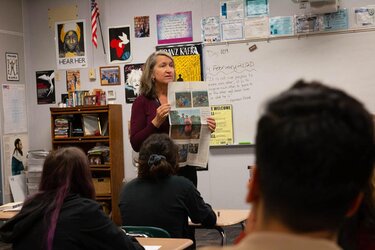
Kim Klett, a teacher at Dobson High School, holds up a newspaper story about the Rwandan genocide during her Holocaust literature class. The Holocaust and other genocides share common threads, Klett said, and she compares the relationship between the Germans and Jews to that of the Tutsi and the Hutu five decades later in Rwanda. | Delia Johnson/Cronkite News
‘Social media is like a knife’
Ambassador Deborah Lipstadt, a leading scholar on antisemitism and the Holocaust, calls it “a delivery system unlike any delivery system we ever had before.”
“Social media is like a knife,” Lipstadt, who has served as President Joe Biden’s special envoy for antisemitism since 2021, told me. “In the hands of a surgeon, it can save a life. In the hands of a bad person, it can take a life. On Oct. 7, we saw unleashed a tsunami, an explosion of antisemitism unlike anything I ever witnessed or anticipated in my life.”
Successfully combating these forces depends on countering the proliferation of misinformation and lies and the overly simplistic versions that are often recounted of historical events. “I’m not yet sure what kind of narratives it would take to do that,” Benkert, the ASU professor who hosted the university’s annual Genocide Awareness Week events in April, acknowledged.
Current approaches simply don’t account for how perceptions of Jews have changed. Jews are now a successful minority, with a modern country of their own, no longer the victims of repeated mass persecution. Israel’s prosecution of the war in Gaza and the mounting casualties on the Palestinian side — over 34,000 now, according to some estimates — is being used to reinforce criticism that Israel is no longer a victim but perpetrating war crimes against a defenseless civilian population. A Harris poll conducted with the Center for American Political Studies at Harvard University recently found that two-thirds of Gen Z Americans between the ages of 18 and 24 agreed that “Jews as a class are oppressors and should be treated as oppressors.”
“The problem now is what is happening in Israel complicates this,” said Dan Stone, a professor of modern history and director of the Holocaust Research Institute at Royal Holloway, University of London. “Because the schoolchildren or whoever else goes to a museum, the picture they get as Jews as victims, refugees, stateless people, dying skeletons in the concentration camps in their final days, this contrasts massively with the image we have of Jews today: The opposite of victims — successful, for the most part, in the countries in which they live, and victimizers in the Middle East context. That’s very problematic.”
Other leading educators say they, too, are confronting the realization that the old narratives aren’t getting through.
“We taught about historic antisemitism, to some extent. Not about its manifestations now,” Lauren Apter Bairnsfather, CEO of the Anne Frank Center USA, which is dedicated to preserving the life and legacy of the most famous child victim of the Holocaust, told me. “So you have a lot of confusion among young people and teachers and the people that young people are coming to for answers. I know that our educators really need support.”
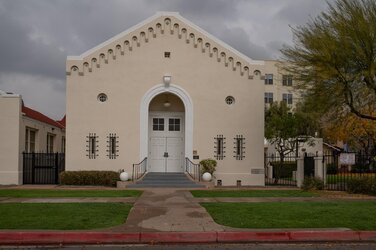
The restored Temple Beth Israel, Phoenix's oldest synagogue, will serve as the nucleus of the new Holocaust Education Center. | Sarah Adler for POLITICO
‘Feel the fear’
In Arizona, organizers want the new center to be the primary resource for public school teachers to carry out the education mandate.
“It became clear that what we were doing with the Holocaust education center project needed to meet the mandates of the state,” Bell, the executive director of the historical society, said. “It needed to be able to serve that population of students. He said it “sort of morphed” from being a “Holocaust museum-type project to being an education center that’s specifically being designed for students from 7th to 12th grade age groups.”
That means catering more to a younger audience, not simply with stories of local Holocaust survivors, artifacts or a timeline of the key events — standard fare in most museums.
“We want it to be a complete experience that inspires all your senses, with color and sound and texture,” Mary Ellen Page, a member of the content committee, told me. The goal is for students to understand “what it was like to have no friends, no one on your side, the law was against you,” to “feel the fear, the disgust, but leave positive and looking forward to the future and to make a difference.”
Patrick Gallagher, president and founder of Gallagher & Associates, the design firm that has been hired to develop and curate the education center, told donors in late March that visitors will experience their own interactive journey that will require them to reflect on what they would choose to do to combat persecution today. “This core narrative will connect students to real world calls to action,” he explained. “These moments are critical for decision-making and will change the outcome of an event, a challenge, or an interaction.”
Gallagher told me his firm, which also designed the National Museum of African American History and Culture and the National World War II Museum, views this project as particularly challenging and acutely important. “Every Holocaust museum in the world is rethinking how to contextualize what is happening today because of the rise of hatred and antisemitism,” he said. “It is a big, big challenge how to deal with antisemitism today. Kids are paralyzed.”
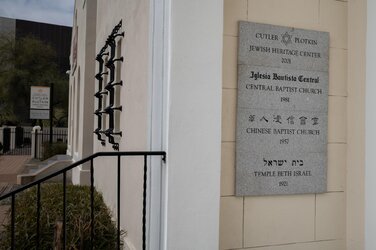
In Arizona, organizers want the new center to be the primary resource for public school teachers to carry out the education mandate. | Sarah Adler for POLITICO.
Lipstadt thinks it is critical for youngsters to learn how censorship, propaganda, discriminatory policies, and ultimately state-sanctioned dehumanization of Jews by Nazi Germany led to the Holocaust. “Hitler didn’t say on the first day, ‘Let’s kill the Jews,’” she said. “It’s a slow, evolving process. There should be some sense of how this begins.”
That’s also a major message from social media influencers like Montana Tucker, a 31-year-old singer/songwriter, actress and social media activist who is the granddaughter of Holocaust survivors and who has used her platform of millions of followers to produce personal and emotional videos to combat antisemitism.
“There’s so many people that say, ‘The Holocaust can never happen again,’” she told me. “They think it’s ridiculous to compare what is happening now to the Holocaust. If social media was around back then, it would have started with the posts. It doesn’t start with mass murder. It starts with laughing at someone else’s pain. These small moments of hatred and evil eventually add up.”
But Bairnsfather, who was the executive director of the Holocaust Center of Pittsburgh at the time of the mass shooting in 2018 at the Tree of Life synagogue, said she is optimistic the organizers here and Holocaust educators more broadly understand what they need to do.
“You need to offer to emerging adults transformative experiences, an opportunity for a student to interact with the history, and make the meaning of it for themselves,” she said. “Give them an opportunity, whether it’s through leading a tour through an exhibition or being part of a theatrical performance, that takes the experience to another level so that it becomes for the student a personal experience where they can see how this history connects.”
At the community event to help build public support for the new center last fall, members of the Ingleside Middle School choir performed. They silently turned their backs to the audience to reveal large, yellow stars pinned to their dark clothing.
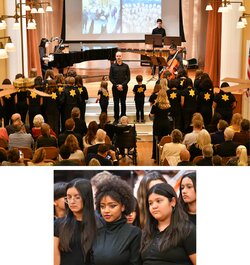
Top; members of the Ingleside Middle School choir perform "Music and the Holocaust to celebrate the 98th birthday of Oskar Knoblauch. Bottom; Ingleside Middle School students depict some of the Jewish orphans who were deported to Nazi death camps. | Courtesy of the Arizona Jewish Historical Society
They represented 192 Jewish orphans who were deported en masse to the Nazi extermination camps at Treblinka and Auschwitz, a story recounted in the debut performance of “Lost Nursery Rhymes for Innocent Children” by Canadian composer Christie Morrison.
An adult tenor, clutching the hands of two small children, played the role of Janusz Korczak, the Polish Jewish physician who remained with the orphans as they were marched to the gas chambers, “singing together, with beaming faces,” in the words of one eye-witness. “On this train we’ll ride,” the tenor softly instructed the children. “I’ll be right by your side. Hold on tight. You will be all right. We will sing some nursery rhymes.”
The choir softly sang traditional lullabies such as “Three Blind Mice” before mimicking the sounds of the train that would transport them to their deaths — the whine of the whistles, the screeching of brakes. Finally, with growing horror on their faces, the choir chanted, “Breathe! Breathe!”, their voices growing steadily fainter as they re-created the orphans’ last moments. “Breathe.”
Addison Trent, 13, a 7th-grader encountering the subject of the Holocaust largely for the first time, told me afterward that “before I joined this project, I didn’t know much about the Holocaust.” But she said that once she learned the material they were to perform, “I cried more than I’d like to admit.”
‘Bombarded with endless streams of shit’
I met Oskar Knoblauch for coffee at the Jewish Historical Society not long before the performance.
“I keep saying, ‘You know, this is deja vu,’ All the rhetoric, all the words they use,” Knoblauch told me. “Unfortunately, conspiracy theories, bullying, lying and giving out misinformation is the new normal in our society. Conspiracy theories even spread through elementary and high schools.” He said he implores the students he meets with to “not to listen to conspiracy theories,” exclaiming, “They’re poison!”
To Stone, the author of The Holocaust: An Unfinished History, that advice gets to the heart of the challenge today of teaching not just the Holocaust but history in general.
“Part of modern education today is teaching children how to distinguish between what’s crap, and what’s not, online,” he said. “That’s one of the most important things they need to learn. Because they are bombarded with endless streams of shit on Snapchat and whatever it is they use. They have to be able to have a filter to work out what’s reliable.”
But he also warned that successfully transmitting the lessons of the Holocaust and the scourge of antisemitism is only one part of controlling the “crabgrass,” as Knoblauch described it in his interactive video.
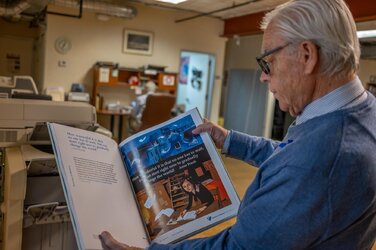
Rabbi Jeffrey Schesnol, the project director of Phoenix's new Holocaust Education Center, holds open a book. | Sarah Adler for POLITICO
“It is a much broader social issue,” Stone told me. “When societies are in crisis you can teach all you like about the need for tolerance, but it will go out the window. And antisemitism is very deeply rooted in Western society. What we see is that when there are moments of crisis in society antisemitism flares up again.”
“If there is a rise in antisemitism today,” he added, “it has something to do with Israel, but it also has to do with the crisis that modern liberal democracies are in.”
I asked Knoblauch whether he thinks another Holocaust could take place here. “Yes,” he responded. “That doesn’t mean it’s going to happen against Jews.”
Politico (archive.ph)
By Bryan Bender
2024-04-27 11:00:00GMT

Author Bryan Bender interviews the "interactive biography" of Holocaust survivor Oskar Knoblauch. | Sarah Adler for POLITICO
PHOENIX — On a recent afternoon in the state’s oldest synagogue, a college sophomore sat in front of a large video screen and posed an age-old question to the recorded image of a balding man in a blue dress shirt, fidgeting in an armchair.
“What is antisemitism?” the young woman inquired. After a few seconds — the time it took for a natural language processing program to engage — the man on the screen began to speak. His voice was gravelly but clear and still retained a hint of his childhood in Leipzig, Germany, during World War II.
“Antisemitism is like crabgrass,” Oskar Knoblauch, a 98-year-old Holocaust survivor, responded. “It always appears after a rainy season. When it’s dry, you don’t see them. They reappear again. Sometimes, maybe in a small way, sometimes worse. We have to control it.”
The real Knoblauch, a lifelong activist who has visited dozens of Arizona schools and community centers to share his life story, is among a quickly dwindling group who can still bear witness to the extermination of 6 million Jews and millions of others by Nazi Germany eight decades ago. Even the youngest survivors are reaching the end of their natural lives; it is estimated that by 2030 only 100,000 Holocaust survivors worldwide will remain.

Holocaust survivor Oskar Knoblauch talks to students from Ingleside Middle School at a performance of "Music and the Holocaust." | Courtesy of Arizona Jewish Historical Society
Knoblauch’s “interactive biography” — some 2,000 of his responses have been recorded, allowing people like the college sophomore to have extended “conversations” with him and other survivors — will be a featured exhibit in what organizers at the Arizona Jewish Historical Society envision as a state-of-the-art Holocaust and genocide education facility. There are scores of Holocaust museums in the United States, with at least a half-dozen now being constructed or revamped, but Phoenix stands out as the largest American city without one. The timing of the new project, called the Hilton Family Holocaust Education Center for the primary funders, has coincided auspiciously with the effort by Arizona lawmakers on both sides of the aisle to enhance Holocaust education in the state’s public schools. This combination of private initiative and legislative mandate has made Arizona something of a laboratory for how to devise innovative teaching methods. The growing consensus is that to overcome the dehumanizing partisanship of social media young people need to be trained to empathize with victims of oppression, not just presented with dry textbook facts.
In 2021, the state Legislature passed a law that required students be introduced to the Holocaust at least twice between grades 7 and 12, joining more than two dozen other states that have enacted similar mandates over the decades, producing what most advocates agree have been mixed results. Arizona still has no official curriculum, or dedicated funding to support related programs and teacher training, and no formal mechanism to ensure school districts are following the law.
“What we are doing isn’t working in its own right,” Volker Benkert, a professor of German and European history at Arizona State University who studies the roots of genocide and is advising the education center organizers, told me. “I’m worried that we are building a Holocaust museum with narratives of the past.”
A recent poll by YouGov and The Economist found that one in five young Americans believe the Holocaust is a myth. A United Nations review in 2021 of thousands of posts on social media sites such as Facebook, X (formerly Twitter), TikTok, Instagram and Telegram also found that significant percentages of Holocaust-related content either “denied or distorted” the historical facts. On Telegram, it was fully half of all the posts reviewed.
This denial parallels a steep rise in antisemitic rhetoric and violence nationwide that has been supercharged by Israel’s military counteroffensive in Gaza following the Oct. 7 massacre of 1,200 Jews by the terrorist group Hamas. “For a group that represents only about 2.4 percent of the American public, they account for something like 60 percent of all religious-based hate crimes,” FBI Director Christopher Wray testified in October to the Senate Homeland Security and Government Affairs Committee, referring to the population of an estimated 7 million American Jews. Just ahead of the Passover holiday, Wray told Congress last week that between Oct. 7 and Jan. 30, “we opened over three times more anti-Jewish hate crime investigations than in the four months before Oct. 7.”
The effort to reclaim the upper hand in the information war was on display at a community performance not long ago at the Arizona Jewish Historical Society, which operates out of the restored Spanish-style synagogue built in 1921 that will serve as the nucleus of the $30-million education center.
“You are the last generation of students that are going to get to meet and interact and talk to Holocaust survivors,” Lawrence Bell, executive director of historical society, told youngsters from Ingleside Middle School. “Right now, we are in a wave of antisemitism. They are going to say the Jewish people just invented the Holocaust because they want sympathy for all the bad things they do. And you’re going to say ‘No, that’s not true, that’s false. I met a person that was in the Holocaust, that survived it.”
“You are the last generation,” he added, “that is going to be able to say that.”

Holocaust survivors and supporters asked state lawmakers to require the Holocaust and other genocides to be taught in Arizona schools. | Annabella Piunti/Cronkite New
‘You can’t bury it’
Some of Ben Toma’s earliest memories growing up in Romania were of family road trips to visit his grandparents. Along the route, he was perplexed by a hillside cemetery, walled off, the grave markers painted white.
“I had seen cemeteries, but they are usually around a church,” he recounted to me. “I asked my mom, ‘What is that?’ She finally told me, ‘That’s where the Nazis rounded up a number of Jews and murdered them.’”
The 44-year-old father of five is now the Republican speaker of Arizona’s House of Representatives and a leading supporter of building the new education center, including backing legislation to allocate state funds. “If you don’t educate kids on what happened, you’re more likely to repeat it,” said Toma, who fled the communist regime in Romania with his family in 1986.
He sees the rise of antisemitism, particularly on college campuses, as mostly a well-meaning desire to right wrongs, in many instances overcorrecting for the long and tragic history of the Palestinian people by arguing against Israel’s right to exist. “Some of them are marching for the wrong reasons, out of confusion,” he told me. “Some of them don’t understand what’s actually happening in Israel. But I think there are among them those [who] fundamentally do hate still. At the end of the day, I think that’s evil.”
“There is a long history to [antisemitism] and you can’t bury it,” he added. “If you bury it, these young, idealistic kids will have no idea of what actually happened and what led to the current state of affairs.”
Toma, who invited Holocaust survivors to attend the opening of the legislative session in January, has joined with 30-year-old Democratic state Rep. Alma Hernandez, the first Mexican American Jewish woman to hold elected office in the United States, to ensure the Arizona Holocaust education mandate is met.
Hernandez, the lead sponsor of the original Holocaust legislation in 2021, more recently steered a funding bill through the state Legislature seeking up to $10 million to support the new education center. The final amount is still to be negotiated by House and Senate leaders, including Toma. That’s on top of a $2 million commitment last fall from the city of Phoenix.
There’s a gap, however, between the Legislature’s will and what happens in the classroom.
The superintendent of Arizona public schools, Tom Horne, recently reported that a survey of the state’s 750 districts raises serious questions about whether the mandate is being followed. “That’s why we need a bill giving it some substance, and this survey that we did from superintendents confirms that need because if over half didn’t respond it makes you think, ‘Well, maybe they weren’t doing it or doing it in a very minimal way,’” Horne said.
To remedy that, Hernandez sponsored separate legislation this session to establish a commission to determine how best to ensure the education mandate is carried out, including by assessing the approaches of other states. The bill was signed by Democratic Governor Katie Hobbs this month.
“The law is the law,” Hernandez told me. “But how are we actually ensuring that is being done? We expect students and schools to report any hate crimes, report anything that happens to Jewish students. But what are we doing to actually prevent that from happening? Hate is learned. Kids are not born hating Jews and hating Israel. They learn that over time. They learn that from people in their surroundings. They learn that unfortunately a lot of times from their friends, their parents, social media.”

Kim Klett, a teacher at Dobson High School, holds up a newspaper story about the Rwandan genocide during her Holocaust literature class. The Holocaust and other genocides share common threads, Klett said, and she compares the relationship between the Germans and Jews to that of the Tutsi and the Hutu five decades later in Rwanda. | Delia Johnson/Cronkite News
‘Social media is like a knife’
Ambassador Deborah Lipstadt, a leading scholar on antisemitism and the Holocaust, calls it “a delivery system unlike any delivery system we ever had before.”
“Social media is like a knife,” Lipstadt, who has served as President Joe Biden’s special envoy for antisemitism since 2021, told me. “In the hands of a surgeon, it can save a life. In the hands of a bad person, it can take a life. On Oct. 7, we saw unleashed a tsunami, an explosion of antisemitism unlike anything I ever witnessed or anticipated in my life.”
Successfully combating these forces depends on countering the proliferation of misinformation and lies and the overly simplistic versions that are often recounted of historical events. “I’m not yet sure what kind of narratives it would take to do that,” Benkert, the ASU professor who hosted the university’s annual Genocide Awareness Week events in April, acknowledged.
Current approaches simply don’t account for how perceptions of Jews have changed. Jews are now a successful minority, with a modern country of their own, no longer the victims of repeated mass persecution. Israel’s prosecution of the war in Gaza and the mounting casualties on the Palestinian side — over 34,000 now, according to some estimates — is being used to reinforce criticism that Israel is no longer a victim but perpetrating war crimes against a defenseless civilian population. A Harris poll conducted with the Center for American Political Studies at Harvard University recently found that two-thirds of Gen Z Americans between the ages of 18 and 24 agreed that “Jews as a class are oppressors and should be treated as oppressors.”
“The problem now is what is happening in Israel complicates this,” said Dan Stone, a professor of modern history and director of the Holocaust Research Institute at Royal Holloway, University of London. “Because the schoolchildren or whoever else goes to a museum, the picture they get as Jews as victims, refugees, stateless people, dying skeletons in the concentration camps in their final days, this contrasts massively with the image we have of Jews today: The opposite of victims — successful, for the most part, in the countries in which they live, and victimizers in the Middle East context. That’s very problematic.”
Other leading educators say they, too, are confronting the realization that the old narratives aren’t getting through.
“We taught about historic antisemitism, to some extent. Not about its manifestations now,” Lauren Apter Bairnsfather, CEO of the Anne Frank Center USA, which is dedicated to preserving the life and legacy of the most famous child victim of the Holocaust, told me. “So you have a lot of confusion among young people and teachers and the people that young people are coming to for answers. I know that our educators really need support.”

The restored Temple Beth Israel, Phoenix's oldest synagogue, will serve as the nucleus of the new Holocaust Education Center. | Sarah Adler for POLITICO
‘Feel the fear’
In Arizona, organizers want the new center to be the primary resource for public school teachers to carry out the education mandate.
“It became clear that what we were doing with the Holocaust education center project needed to meet the mandates of the state,” Bell, the executive director of the historical society, said. “It needed to be able to serve that population of students. He said it “sort of morphed” from being a “Holocaust museum-type project to being an education center that’s specifically being designed for students from 7th to 12th grade age groups.”
That means catering more to a younger audience, not simply with stories of local Holocaust survivors, artifacts or a timeline of the key events — standard fare in most museums.
“We want it to be a complete experience that inspires all your senses, with color and sound and texture,” Mary Ellen Page, a member of the content committee, told me. The goal is for students to understand “what it was like to have no friends, no one on your side, the law was against you,” to “feel the fear, the disgust, but leave positive and looking forward to the future and to make a difference.”
Patrick Gallagher, president and founder of Gallagher & Associates, the design firm that has been hired to develop and curate the education center, told donors in late March that visitors will experience their own interactive journey that will require them to reflect on what they would choose to do to combat persecution today. “This core narrative will connect students to real world calls to action,” he explained. “These moments are critical for decision-making and will change the outcome of an event, a challenge, or an interaction.”
Gallagher told me his firm, which also designed the National Museum of African American History and Culture and the National World War II Museum, views this project as particularly challenging and acutely important. “Every Holocaust museum in the world is rethinking how to contextualize what is happening today because of the rise of hatred and antisemitism,” he said. “It is a big, big challenge how to deal with antisemitism today. Kids are paralyzed.”

In Arizona, organizers want the new center to be the primary resource for public school teachers to carry out the education mandate. | Sarah Adler for POLITICO.
Lipstadt thinks it is critical for youngsters to learn how censorship, propaganda, discriminatory policies, and ultimately state-sanctioned dehumanization of Jews by Nazi Germany led to the Holocaust. “Hitler didn’t say on the first day, ‘Let’s kill the Jews,’” she said. “It’s a slow, evolving process. There should be some sense of how this begins.”
That’s also a major message from social media influencers like Montana Tucker, a 31-year-old singer/songwriter, actress and social media activist who is the granddaughter of Holocaust survivors and who has used her platform of millions of followers to produce personal and emotional videos to combat antisemitism.
“There’s so many people that say, ‘The Holocaust can never happen again,’” she told me. “They think it’s ridiculous to compare what is happening now to the Holocaust. If social media was around back then, it would have started with the posts. It doesn’t start with mass murder. It starts with laughing at someone else’s pain. These small moments of hatred and evil eventually add up.”
But Bairnsfather, who was the executive director of the Holocaust Center of Pittsburgh at the time of the mass shooting in 2018 at the Tree of Life synagogue, said she is optimistic the organizers here and Holocaust educators more broadly understand what they need to do.
“You need to offer to emerging adults transformative experiences, an opportunity for a student to interact with the history, and make the meaning of it for themselves,” she said. “Give them an opportunity, whether it’s through leading a tour through an exhibition or being part of a theatrical performance, that takes the experience to another level so that it becomes for the student a personal experience where they can see how this history connects.”
At the community event to help build public support for the new center last fall, members of the Ingleside Middle School choir performed. They silently turned their backs to the audience to reveal large, yellow stars pinned to their dark clothing.

Top; members of the Ingleside Middle School choir perform "Music and the Holocaust to celebrate the 98th birthday of Oskar Knoblauch. Bottom; Ingleside Middle School students depict some of the Jewish orphans who were deported to Nazi death camps. | Courtesy of the Arizona Jewish Historical Society
They represented 192 Jewish orphans who were deported en masse to the Nazi extermination camps at Treblinka and Auschwitz, a story recounted in the debut performance of “Lost Nursery Rhymes for Innocent Children” by Canadian composer Christie Morrison.
An adult tenor, clutching the hands of two small children, played the role of Janusz Korczak, the Polish Jewish physician who remained with the orphans as they were marched to the gas chambers, “singing together, with beaming faces,” in the words of one eye-witness. “On this train we’ll ride,” the tenor softly instructed the children. “I’ll be right by your side. Hold on tight. You will be all right. We will sing some nursery rhymes.”
The choir softly sang traditional lullabies such as “Three Blind Mice” before mimicking the sounds of the train that would transport them to their deaths — the whine of the whistles, the screeching of brakes. Finally, with growing horror on their faces, the choir chanted, “Breathe! Breathe!”, their voices growing steadily fainter as they re-created the orphans’ last moments. “Breathe.”
Addison Trent, 13, a 7th-grader encountering the subject of the Holocaust largely for the first time, told me afterward that “before I joined this project, I didn’t know much about the Holocaust.” But she said that once she learned the material they were to perform, “I cried more than I’d like to admit.”
‘Bombarded with endless streams of shit’
I met Oskar Knoblauch for coffee at the Jewish Historical Society not long before the performance.
“I keep saying, ‘You know, this is deja vu,’ All the rhetoric, all the words they use,” Knoblauch told me. “Unfortunately, conspiracy theories, bullying, lying and giving out misinformation is the new normal in our society. Conspiracy theories even spread through elementary and high schools.” He said he implores the students he meets with to “not to listen to conspiracy theories,” exclaiming, “They’re poison!”
To Stone, the author of The Holocaust: An Unfinished History, that advice gets to the heart of the challenge today of teaching not just the Holocaust but history in general.
“Part of modern education today is teaching children how to distinguish between what’s crap, and what’s not, online,” he said. “That’s one of the most important things they need to learn. Because they are bombarded with endless streams of shit on Snapchat and whatever it is they use. They have to be able to have a filter to work out what’s reliable.”
But he also warned that successfully transmitting the lessons of the Holocaust and the scourge of antisemitism is only one part of controlling the “crabgrass,” as Knoblauch described it in his interactive video.

Rabbi Jeffrey Schesnol, the project director of Phoenix's new Holocaust Education Center, holds open a book. | Sarah Adler for POLITICO
“It is a much broader social issue,” Stone told me. “When societies are in crisis you can teach all you like about the need for tolerance, but it will go out the window. And antisemitism is very deeply rooted in Western society. What we see is that when there are moments of crisis in society antisemitism flares up again.”
“If there is a rise in antisemitism today,” he added, “it has something to do with Israel, but it also has to do with the crisis that modern liberal democracies are in.”
I asked Knoblauch whether he thinks another Holocaust could take place here. “Yes,” he responded. “That doesn’t mean it’s going to happen against Jews.”